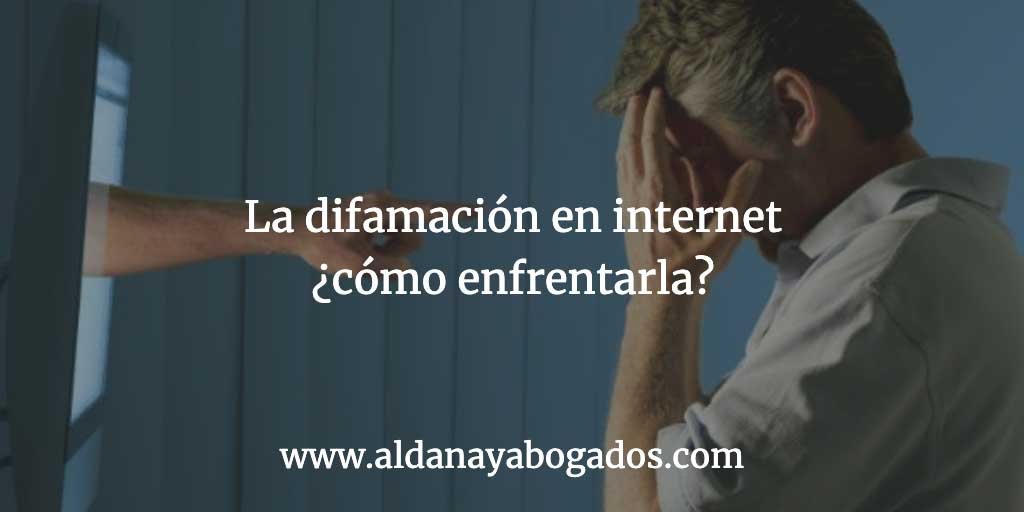In the network everything is disseminated unlimitedly. The Internet shows a scenario of reality that humanity had not experienced before, so despite the time that has passed since it appeared as a new channel, all the rules and laws that regulate this virtual space are still not clear. The use has been demanding the establishment of measures to ensure its proper functioning and the protection of the fundamental rights of its users.
Among the actions or offenses that began to require an update are the following of the virtual regulation is defamation, as it is sometimes the anonymity afforded by the network and the lack of controls makes it easy for any person to feel comfortable expressing himself without any responsibility for the information he transmits. In this way, it is very easy to make judgments and opinions without having confirmed the veracity of the data published.
As a result, defamation is a growing crime in the digital world. It is defined as an action or expression that damages the dignity of another person, it is a general term that encompasses any statement that affects the reputation and image of a person or institution. It is considered as a crime against honor, the same as slander, the difference between one and the other is that in the latter the person who accuses the aggrieved is aware of the falsity of the information provided.
Some companies or digital channel platforms have clear policy and privacy rules. which provides them and their users with a manual of procedures to denounce and act in the event that a third party publishes defamatory information through these channels. Such was the case, reported by the BBC, experienced by the owner of an IT services company in the United Kingdom, who had been accused of being a pedophile and a thief through a comment made by an alleged client on Google's Place. He reported the case to Google and 18 months later, after all the investigations, the Internet giant removed the comment that tarnished the reputation of the IT company owner. Unfortunately, despite the fact that the source of the news removed the false information, other media replicated it and made it organic, maintaining and perpetuating the damage in other portals.
When facing a case of defamation on the Internet, it is important to bear in mind that the information can go viral in a short time, so it is advisable to act quickly. These are some of the actions to take into account when becoming a victim of this crime:
- Identify the perpetrator of the defamation and if it is possible to trace the path of the information, with the intention of knowing in which sites it was published.
- If the author was identified and contacted (this is not always possible), contact him/her and request the rectification of the information. If necessary, document your arguments with the evidence you have.
- If the author of the information refuses to correct the informationyou should proceed legally. It is best to seek the advice of a legal expert in this area. If this is not possible, you can personally investigate the security and privacy policies of the pages where the information was published and contact their administrators to evaluate the situation and the actions to be taken.
- In the legal process it is the judge who determines whether the case is a defamation offense or not. This procedure should occur in the same way as the lawsuit is handled when the crime is committed on offline media.
- It is important to continuously monitor what is being said about us. (if we are a public figure) or of our company on the networks, in order to be able to act accurately and quickly in the face of defamatory actions. The Google Alerts service is a good strategy to keep an eye on publications.
- Collect as much evidence as possible to support their arguments at any stage of the process.
- Specialists warn that the difference between defamation and personal opinion, as well as the possible exceptions, must be clearly understood.The opinions or animos iocandi may not contain any illegal action if they do not accuse someone or a legal person of wrongdoing.
- Education is fundamental to prevent this type of actions. that can seriously affect reputation. It is a matter of taking responsibility and being cautious when sharing information on the Internet, since not everything published has been duly confirmed.
- Make a map where the news have been published.
- Contact all responsible parties and ask them for the right of rectification.
Despite the fact that reports of this type of cases have increased exponentially due to the boom of digital platforms and their use in the world, few cases reach a legal resolution because the perpetrators usually apologize to the aggrieved parties beforehand. When this happens, the sanctions are annulled or reduced depending on the situation and its aggravating factors.
The Spanish Penal Code regulates the crimes of libel and slander.without touching directly on the term defamation. In this regulation, audio recordings, testimonies, psychological expert reports and copies of messages are considered valid as evidence to denounce a libel or slander. The basic elements of this type of denunciation have been catalogued as follows by the Spanish legal body:
- Court of instruction to which the complaint is addressed.
- Personal data of the plaintiff and the defendant.
- Detail of the actions that can be followed to learn the facts.
- Relation of the facts in chronological order.
- Legal basis.
- Request for the complaint to be admitted for processing.
- Signature.
The complaint must be signed by the lawyer and the attorney. and once the case is investigated, a trial will be held. In the event of a conviction, the results will be published and disclosed as a way of compensating the victim for the damage caused.
In the Venezuelan Penal Code, defamation and libel are punishable by imprisonment of 15 months to 18 months.The penalty may be even higher if the offense is committed in a public document, with writings, drawings disclosed or exposed to the public through other means of publicity. Fines may also be imposed according to the seriousness of the action committed.
Alan Aldana & Abogados has successfully prosecuted defamation and libel cases on behalf of clients in countries such as Spain and Venezuela, where in addition to generating the corresponding legal liability of those responsible, we have facilitated the exclusion of false news in web search engines with which we have an action protocol for the elimination of the same, always in pursuit of truth and justice.













